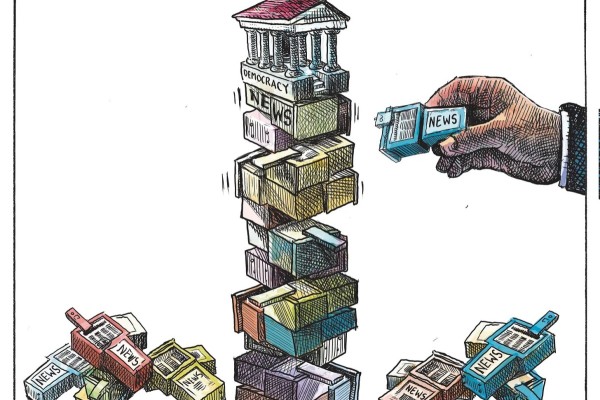Google argues for media fund to support Canadian journalism
The global search giant might discontinue its free news story search service in Canada

Federal estimates put the digital platforms potentially on the hook for more than $300 million a year in payments if Bill C-18, the Online News Act, passes. Photo from Shutterstock.
Google would rather contribute to a fund supporting Canadian news, similar to one it set up recently in Taiwan, than be forced to negotiate deals with media outlets under Bill C-18, the Online News Act, according to head office executives called on Ottawa’s virtual carpet last week. Google claims the bill’s “undue preference” provision, which would prevent it from favouring news outlets, could “break” its search engine by incentivizing clickbait and requiring it to pay for non-factual or misleading content.
Mention of a fund prompted Conservative MP Martin Shields to attempt negotiations with Google then and there. “When you talk about a fund, what number would you talk about for Canada?” he asked. “I’m looking for a number. You may not want to negotiate with me but you’re bringing it up. Put the number on the table.” When the Google executives refused to be drawn into talking dollars, Shields expressed doubt that newspaper publishers in his Alberta riding of Bow River would ever see any money from it. “I represent 13 weekly newspapers,” he said. “Frankly, I don’t think they’re going to get two cents out of this thing.”
Shields then raised a possible “gotcha” question when he grilled the Google witnesses about a Globe and Mail article from last week that had disappeared from its search results. “It showed up [but] within hours it disappeared,” said Shields. “You buried it. It wasn’t in support of what you do and it disappeared off of your site.” The article, which was headlined “Google devises radical changes to stay on top,” later showed up on a Google search, but only from the Vancouver-based digital distribution service Press Reader.
“We certainly do not bury articles,” insisted Richard Gingras, Google’s vice-president for news. “I can assure you that is a practice we would never enter into.” Conservative MP Kevin Waugh, who was acting as committee chair in the absence of Liberal MP Hedy Fry, backed Shields up. “I saw the article in Monday’s Globe and Mail and tried to download it. The Library of Parliament could not give me the article. At first you had it high, and then you couldn’t find it. We had to go to the competitor to find that story.”
The same result was found on search engines Bing, Yahoo! and DuckDuckGo over the weekend, however, with the story showing up only on Press Reader. Kent Walker, Google’s president of global affairs and chief legal officer, suggested that “it may well have been changes in the way the website was coded” by the newspaper. A search on text in the article found that it originated from the New York Times, but was not attributed to it. An inquiry to the Globe and Mail’s public editor was not answered after more than 48 hours.
The Google witnesses reiterated to the Heritage ministry’s standing committee that being forced to pay for the right to post links to news stories under Bill C-18 might prompt the global search giant to discontinue its free news story search service in Canada. Meta has already announced that it will stop allowing members of its social network Facebook to post links to Canadian news stories if Bill C-18 passes as written. Gingras told the Heritage committee by videoconference on Thursday that Bill C-18 “would make Canada the first country in the world to put a price on free links to webpages, setting a dangerous precedent that is contrary to the long-term interests of both Canadian readers and Canada’s independent press… Putting a price on links, as C-18 does, will naturally cause any company to reconsider why we would continue to do so.”
Federal estimates put the digital platforms potentially on the hook for more than $300 million a year in payments if Bill C-18 passes, most of which would go not to struggling newspapers but to broadcasters including the CBC and TV networks owned by telecom giants Bell and Rogers. Gingras and Walker, who also appeared virtually, both told the committee that a fund might be a better approach than forced bargaining. “We think there’s a better model,” said Walker. A five-year $595-million federal bailout that provides tax credits to news media in Canada runs out this year. A fund to which media outlets would have to apply has been proposed to replace it by the Public Policy Forum think tank in order to insulate the process of wealth transfer from government or donor influence. It suggested in a 2022 report that a new granting agency, such as “a non-profit corporation, charity or charitable trust,” be set up to ensure a “fully arm’s length governance structure” for the redistribution of funds. Bill C-18, however, would put bureaucrats from the Canadian Radio-television and Telecommunications Commission in charge of negotiations, which has been compared to “putting a baseball umpire in charge of a soccer game.”
Globe and Mail publisher Phillip Crawley agreed in a column last year that “Bill C-18 is the problem” because it “contains language that could allow the newspaper industry to be subject to arbitrary regulation by a quasi-government body.” He noted that broadcasters that have been regulated for decades by the CRTC “employ squads of lawyers and lobbyists to manage that relationship, to their benefit.”
Google has already signed licensing agreements with more than 150 Canadian media outlets through its secretive Google News Showcase, which has allocated US$1 billion worldwide to such deals on a non-negotiable basis, with payments varying based on Google’s calculations. After holding out for collective bargaining with publishers under Bill C-18, Canada’s largest newspaper chain, Postmedia Network, finally signed a deal with Google last year.
Last week’s appearance by Google executives was slightly more civilized than the circus seen last month when its Canadian representatives proved evasive, prompting an aggressive response from some MPs, who ordered them put under oath mid-testimony. Company officials were summonsed to explain after it was reported that Google was test-blocking news for some Canadians in advance of Bill C-18, which led the federal government to accuse the company of “intimidation” tactics. Bill C-18 passed third reading in the House of Commons late last year and is currently before the Senate.
Some MPs continued to press for Google executives to provide evidence of their own wrongdoing. Chris Bittle, parliamentary secretary for Heritage and the sponsor of Bill C-18, accused Google of “questionable lobbying practices” after it was revealed last year to have funded a witness who testified against Bill C-11, the Online Streaming Act. He grilled the Google executives about so-called “astroturfing,” in which companies fund fake grassroots political movements, demanding the “names of entities and individuals that you’re currently paying directly or in kind to advocate against Canadian legislation.”
“We do not make payments to third parties, to astroturf, [or] make payments to YouTube creators to lobby on our behalf,” said Walker. “They were efforts to allow a variety of stakeholders who have their own concerns about legislation to have a seat at the table to have a voice in the parliamentary conversation.” A demand by Bittle for Meta and Google to turn over their correspondence with third parties on this subject has been criticized by the Canadian Chamber of Commerce as “a serious threat to the privacy of Canadians.”
The committee has also summonsed Meta CEO Mark Zuckerberg over his company’s reaction to Bill C-18, but a date has not yet been set for his testimony.
Marc Edge is a journalism researcher and author who lives in Ladysmith, BC. His books and articles can be found online at www.marcedge.com.










